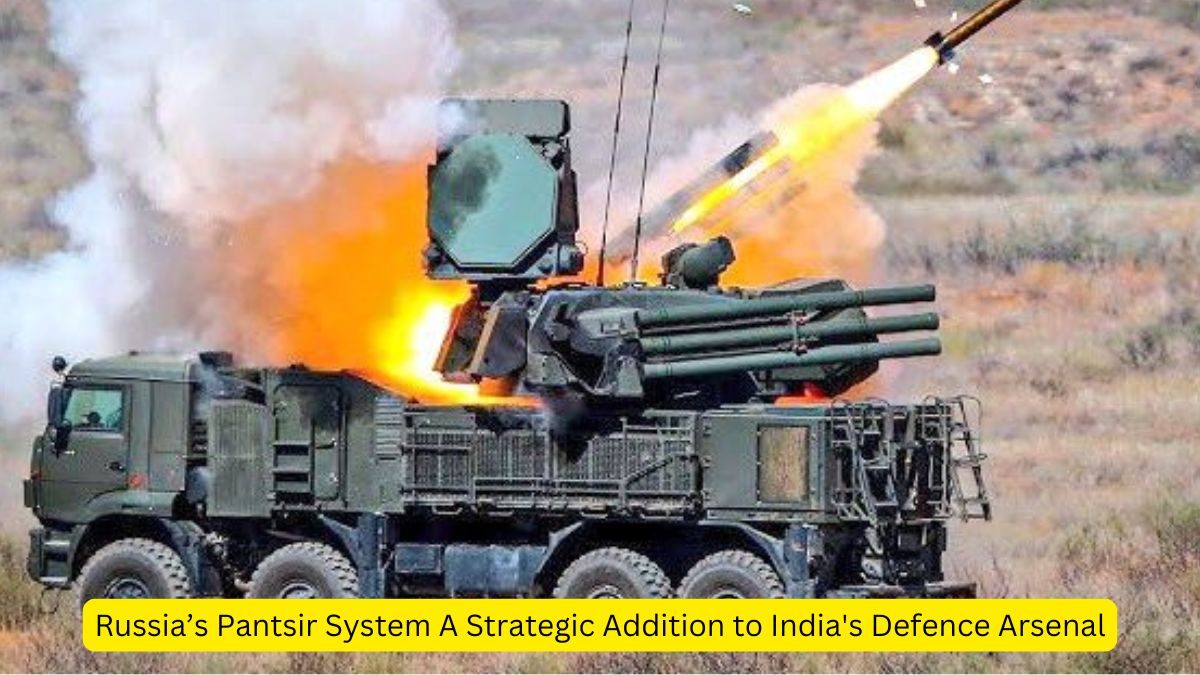India and Russia have reached a significant agreement to jointly manufacture the Pantsir air defence missile-gun system, marking a major step in supporting India’s Atmanirbhar Bharat initiative in the defence sector. The agreement was formalized through a Memorandum of Understanding (MoU) signed between India’s Bharat Dynamics Ltd (BDL) and Russia’s Rosoboronexport (ROE).
Introduction
- India and Russia have signed a major agreement to jointly manufacture the Pantsir air defence missile-gun system.
- Bharat Dynamics Ltd (BDL) and Russia’s Rosoboronexport (ROE) signed a Memorandum of Understanding (MoU).
- This collaboration supports India’s Atmanirbhar Bharat initiative in the defence sector.
Key Points of the Agreement
Signatories
- BDL’s CMD Cmde A. Madhavarao (Retd) and Mr. Kovalenko German from ROE.
Context
- Agreement signed on the sidelines of the 5th India-Russia Inter-Governmental Commission (IRIGC) Subgroup meeting in Goa.
Purpose
- To manufacture the Pantsir air defence missile-gun system in India under the ‘Make in India’ programme.
Strategic Importance
- Strengthens bilateral defence ties and enhances India’s defence capabilities.
Joint Manufacturing
- Focus on producing spare parts, components, and aggregates for Russian-origin defence equipment.
Details of the Pantsir Air Defence System
Components
- A missile launcher, radar truck, and command post.
Designed to Provide
- Point air defence against aircraft, helicopters, UAVs, precision munitions, and cruise missiles.
Key Features
- Missile Range: Up to 20 km with a maximum altitude of 15 km.
- Speed: Missiles reach speeds up to 1,300 m/s.
- Guns: Two 30mm auto-cannons with a range of 4 km for intercepting low-altitude threats like drones.
Current Use
- Critical for protecting Russian President Putin against drone attacks during the Russia-Ukraine war.
International Demand
- Used by Algeria, UAE, Iraq, Syria, and other countries.
Impact on India-Russia Defence Cooperation
Long-standing Ties
- Defence cooperation with Russia has been integral since the Cold War, with over 60-70% of India’s military equipment of Russian origin.
Key Projects
- S-400 System: 5 squadrons ordered; 3 delivered, remaining 2 expected by 2026.
- Guided Missile Warships: First of two ships expected by the end of November.
- AK-203 Rifles & BrahMos Missiles: Joint production in India.
- T-90 Tanks and Su-30 MKI: Licensed production.
Future Outlook
- The Pantsir agreement strengthens India’s autonomy in defence production and enhances self-reliance in line with the Atmanirbhar Bharat mission.
Russia-India Defence Ties
- The foundation of India’s military equipment and technology transfer.
- Continued access to Russian technology reinforces India’s strategic autonomy.
- Strengthens defence self-reliance through partnerships like the Pantsir deal.
| Summary/Static | Details |
| Why in the news? | India and Russia to jointly manufacture the Pantsir air defence missile-gun system. |
| Signatories | Bharat Dynamics Ltd (BDL) and Rosoboronexport (ROE). |
| Event Context | MoU signed during the 5th India-Russia Inter-Governmental Commission (IRIGC) Subgroup meeting in Goa. |
| Purpose | To manufacture the Pantsir system under India’s ‘Make in India’ initiative. |
| Key Features of Pantsir System | – Components: Missile launcher, radar truck, and command post.
– Missile Range: Up to 20 km, altitudes of up to 15 km. – Speed: Missiles can intercept fast-moving targets at speeds of 1,300 m/s. – Guns: 30mm auto-cannons effective against low-altitude threats like drones. |
| Strategic Importance | Enhances India’s defence self-reliance and strengthens India-Russia defence ties. |
| Historical Context | India and Russia have long-standing defence cooperation; 60-70% of India’s military equipment is of Russian origin. |
| Joint Projects with Russia | – S-400 missile system, T-90 tanks, Su-30 MKI, AK-203 rifles, BrahMos missiles.
– Licensed production of military hardware and technology. |




 AIIA Signs MoU with General Insurance Co...
AIIA Signs MoU with General Insurance Co...
 Bharat Taxi Partners with AAI to Launch ...
Bharat Taxi Partners with AAI to Launch ...
 Why Bharat Container Shipping Line Could...
Why Bharat Container Shipping Line Could...








